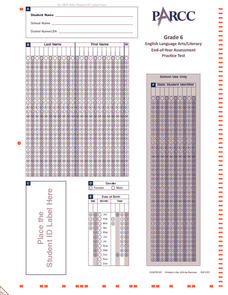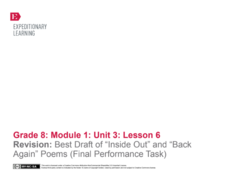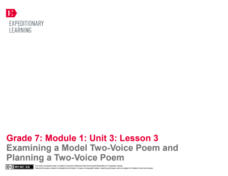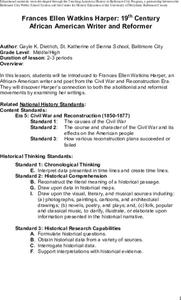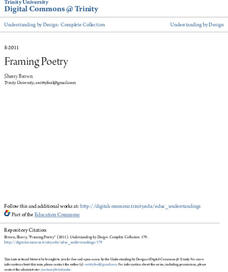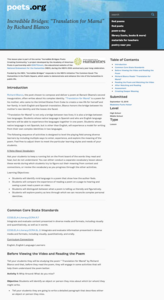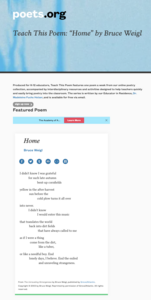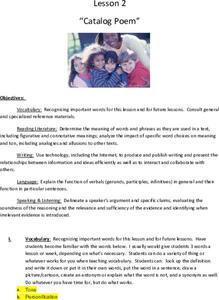National Endowment for the Humanities
Walt Whitman to Langston Hughes: Poems for a Democracy
Explore the idea of democratic poetry. Upper graders read Walt Whitman, examining daguerreotypes, and compare Whitman to Langston Hughes. They describe aspects of Whitman's I Hear America Singing to Langston Hughes' Let America Be...
Curated OER
Exploring Contrasts in "The Lanyard," by Billy Collins
A good gift is hard to find. A “worn truth,” perhaps, as Billy Collins says in his poem, “The Lanyard,” but true nonetheless. After a study of Collins’ tribute to a mother’s love, young poets select an object that sends them “into the...
Curated OER
End-of-Year Practice Test (Grade 6 ELA/Literacy)
With the end of the year quickly approaching it's time to find out exactly how much your sixth graders have learned. Specifically designed for the Common Core ELA standards, this practice test gives students five reading passages,...
EngageNY
Revision: Best Draft of “Inside Out” and “Back Again” Poems (Final Performance Task)
Scholars read their poems to their research teams as their final performance task. The teams listen and give feedback on the flow between the two poems. Writers then take the feedback from their teams and revise their poems before...
Poetry Society
Writing a Personification List Poem
After a close reading of Sylvia Plath's "Mirror" and Flora de Falbe's "Five Things About the Lake," young poets craft their own personification list poem about a very special place.
EngageNY
Examining a Model Two-Voice Poem and Planning a Two-Voice Poem
Successful poetry writing requires three P's: planning, preparation, and practice. Pupils read a model two-voice poem and discuss how the author uses evidence to develop the theme. With a partner, scholars use a rubric to analyze the...
Angel Island Immigration Station Foundation
Moving to the Poems of Angel Island
A poem carved on Angel Island's walls is the guiding text of a lesson that challenges scholars to put movement into a written piece of art. After warm up-activities, learners play a game of "Pass the Clap" and "Pass the Line," in which...
Nasher Museum of Art at Duke University
Are You My Mother? An Opinion Writing Unit
During a five-day lesson, scholars analyze written and visual art—primarily the poem, Mother to Son by Langston Hughes— identify facts, and write opinions. Learners read the poem several times, discuss, write, compare and...
Academy of American Poets
Teaching the Vietnam War with Poetry and Archives
The language of and the perspective of photographs, poems, and official reports differ. After a close reading of two photographs, two poems, and a military report about the Vietnam War, individuals adopt someone's voice or something from...
PBS
Discuss 22-year-old Amanda Gorman’s inaugural poem “The Hill We Climb”
Two poems by National Youth Poet Laureate Amanda Gorman are spotlighted in a PBS lesson. Young scholars conduct a close reading and watch videos of Gorman reading her inaugural poem "The Hill We Climb" and "The Miracle of Morning." They...
Center for History Education
Frances Ellen Watkins Harper: 19th Century African-American Writer and Reformer
Although some African American abolitionists—such as Sojourner Truth and Frederick Douglass—are well known, others, like Frances Ellen Watkins Harper, remain in the shadows of history. Harper was a poet and activist who played an...
Trinity University
Framing Poetry
The big idea in this poetry unit plan is that structure and content work together to create meaning. Class members learn how to identify and mark the metrical patterns and line lengths used in poems. They study the structure of various...
K20 LEARN
Blackout Poetry: Re-Envisioning Writing
Introduce young poets to Blackout Poetry. Much like Found Poems, Blackout Poetry challenges scholars to rethink the process writers may use to craft their poems. After watching a short video in which poet Austin Kleon describes his...
Academy of American Poets
Teach This Poem: "The Snowfall Is So Silent" by Miguel de Unamuno
Cold, beautiful, unique! Class members closely examine John Singer Sargent's watercolor "Snow," taking note of the artist's techniques, and pair up to discuss how the image makes them feel about snow. They then repeat the process with...
Academy of American Poets
Incredible Bridges: “Translation for Mamá” by Richard Blanco
Who or what do you miss? That's the question that launches an activity that asks writers to craft a paragraph filled with sensory details that shows how they feel. Next, they listen to Richard Blanco reading his poem, "Translation for...
Academy of American Poets
Teach This Poem: "When There Were Ghosts" by Alberto Ríos
Before cell phones, tablets, and computers with access to YouTube, before gleaming multiplexes and even before television, there were small theaters with Saturday night black and white movies. Alberto Ríos's poem "When There Were Ghosts"...
Academy of American Poets
Teach This Poem: “Home” by Bruce Weigl
A poetry lesson takes a close look at home. Scholars discuss with partners what they are most grateful for at their homes. A timelapse video showcases potato tubers growing. While watching, pupils write down what they notice. Learners...
K20 LEARN
Memory Haiku: The Great Gatsby and the Sense of Smell
Scholars learn how smells evoke early childhood memories and apply that knowledge to a character from F. Scott Fitzgerald's The Great Gatsby. After finding a passage from the novel that references smells, they craft a haiku and a...
K20 LEARN
The History of Spoken Word Poetry: Historical and Cultural Perspectives In Literature
Spoken word poetry, more than almost any other form, reveals the historical and cultural perspective of the poet. High schoolers listen to various spoken word poems, select one to research in-depth, and then apply what they have learned...
Academy of American Poets
Incredible Bridges: “Cotton Candy” by Edward Hirsch
Read it, hear it, see it, do it! Young poets experience Edward Hirsch's memory poem, "Cotton Candy," by first closely reading the poem silently, then aloud, watching a video of the poet reading it, and crafting their memory poem of an...
Utah Education Network (UEN)
8th Grade Poetry: A to Z Poem
A two-part lesson asks eighth graders first to draw connections between the myth of Aengus and William Butler Yeats' poem "The Song of Wandering Aengus." In the second part of the lesson, writers craft an "A to Z Poem."
Utah Education Network (UEN)
8th Grade Poetry: Catalog Poem
After conducting a close reading of Billy Collin's poem "Forgetfulness" and responding to questions on a worksheet, young poets craft catalog poems and share their work with a partner. The lesson ends with the partner using the provided...
Curated OER
What Is Poetry?
The first lesson of 12 in a poetry unit asks class members to develop their own definition of poetry. After crafting a response, they examine a variety of examples and decide if the resources are or are not poems.
Academy of American Poets
Teach This Poem: "somewhere i have never travelled,gladly beyond" by E. E. Cummings
Scholars engage in a role-play exercise, compare their demonstration to a time-lapse video, and to a poem by E.E. Cummings. The ensuing discussion asks learners to consider the similarities among the three.
Other popular searches
- Elements of Poetry Analysis
- Poetry Analysis Worksheets
- Literary Analysis for Poetry
- Pablo Neruda Poetry Analysis
- Poetry Analysis Rubric
- Tpcastt Poetry Analysis
- Poetry Analysis Document
- Spanish Poetry Analysis
- Reading and Analyzing Poetry
- Poe Poetry Analysis
- Typecast Poetry Analysis
- Analyzing Poetry Structure




